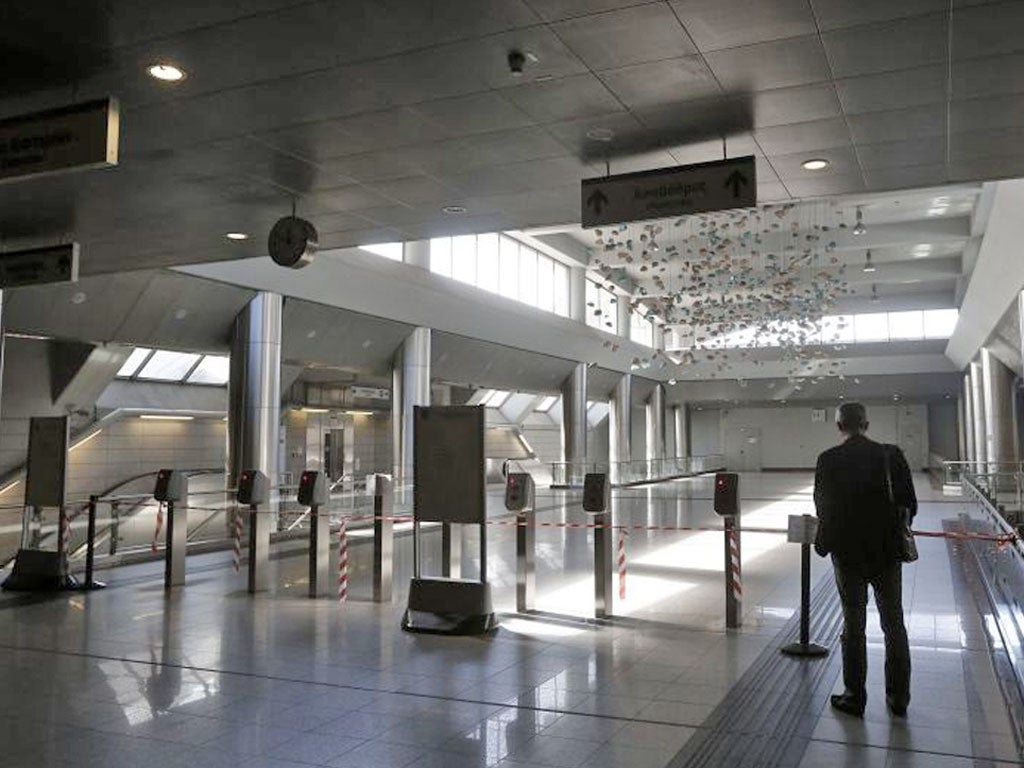Hospital workers and doctors join mass Greek strike
But MPs must vote for new cuts and tax rises to secure a €130bn loan to remain in the euro

Your support helps us to tell the story
From reproductive rights to climate change to Big Tech, The Independent is on the ground when the story is developing. Whether it's investigating the financials of Elon Musk's pro-Trump PAC or producing our latest documentary, 'The A Word', which shines a light on the American women fighting for reproductive rights, we know how important it is to parse out the facts from the messaging.
At such a critical moment in US history, we need reporters on the ground. Your donation allows us to keep sending journalists to speak to both sides of the story.
The Independent is trusted by Americans across the entire political spectrum. And unlike many other quality news outlets, we choose not to lock Americans out of our reporting and analysis with paywalls. We believe quality journalism should be available to everyone, paid for by those who can afford it.
Your support makes all the difference.Greek workers began a week-long series of protests today, upping the pressure on the government to vote down a crucial austerity package in parliament this week.
The painful cuts and tax hikes are demanded by international creditors in exchange for a €31bn loan instalment, designed to save Greece from bankruptcy and prevent the country's exit from the eurozone.
Journalists, state doctors and public transportation workers were among those striking today, their industrial action acting as a prelude to a nationwide 48-hour general strike due to begin today as parliament debates the contentious austerity measures worth €13.5bn.
Taxi drivers marched in the northern port town of Thessaloniki while hospital workers conducted a sit-in at government buildings in Athens yesterday.
Panos Papanikolaou, a neurosurgeon at one of the country's largest hospitals, said the measures would only further undermine the country's ailing healthcare system. "Doctors and hospital workers have started to strike because the measures will ruin our lives and the country's healthcare system," he said. Cuts in healthcare will close down many hospitals, reducing the country's hospital beds by nearly a third, the union of hospital doctors warned.
Mr Papanikolaou, who has been working for over 20 years, has seen his monthly wage drop to €1,330, from €2,030 in 2010. He worries that the spending cuts will reduce his income by another 25 per cent.
The austerity package is scheduled to be voted on on Wednesday, while the budget for 2013 is to be voted on on Sunday. The country's premier, Antonis Samaras, speaking to his party on Sunday warned of "catastrophic" implications if the country were to be forced out of the euro. "It would destroy our society, level our economy and blow up our democracy," he said, in an effort to rally his MPs.
Mr Samaras argued the vital aid would help reverse the country's recession, as only 10 per cent would be used to repay creditors. The cash would be directed at strengthening the banks, allowing them to approve loans and jump-start the economy.
Democratic Left, the junior party in the country's ruling coalition government, opposes thorny labour reforms included in Wednesday's bill that will make it easier for employers to fire staff and reduce salaries in the private sector. The issue has pitted elements within the fragile coalition against each other.
The numerous meetings between the leaders of Greece's coalition partners have failed to resolve the political deadlock as Democratic Left is determined to vote down the package.
The dispute between Democratic Left and the Premier Antonis Samaras is also infecting the country's second largest coalition partner, Pasok.
With Europe's most rapidly rising unemployment rate, at least a quarter of Greece's workers are now unemployed, while recession is expected to grind on for a sixth year. The future of the socialist party Pasok, at the helm of the country over the first two years of the crisis, remains at stake while its popularity continues to plummet.
Analysts believe the austerity measures will be passed by a tight margin.
Join our commenting forum
Join thought-provoking conversations, follow other Independent readers and see their replies
0Comments